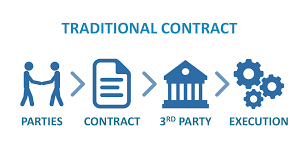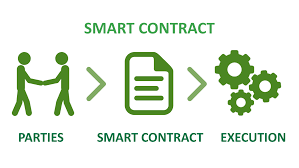Dear Reader,
It’s great to have you back. This week, we’ll be discussing a relatively new field in the world of FinTech, ie smart contracts. In the fast paced world of technology, we have smart phones, smart cars, smart homes and now smart contracts.
What are your thoughts when you think of a contract? what makes a contract valid in law? Is any agreement a contract?
Before exploring the world of smart contracts, let’s briefly answer these questions as we unpack the concept of a contract.
What is a contract?
In very basic terms, a contract is an agreement that is binding in law and enforceable. In the course of our daily affairs, we get into several agreements from something seemingly simple as agreeing to attend a meeting at a certain time to something more complex as agreeing to supply raw materials to a manufacturer. The difference in the example between agreeing to a meeting at 9am and agreeing to supply raw materials is in the obligations, liability and binding nature of the latter agreement.
For a contract to be legally binding and enforceable, there must be an offer, acceptance, consideration (money or its equivalent), intention to create legal relations and capacity to enter into a contract.
Where such elements are present and one party refuses to perform its obligations, the other party may employ the dispute resolution mechanism agreed in the contract, in order to resolve the matter. You may now be wondering what makes a contract ‘smart’?
Smart Contracts
A smart contract is a binding agreement that exists in form of a computer code. This code operates on the blockchain. I did a previous (introductory) post explaining the concept of a blockchain. You can find it here.
The distributed ledger technology that underpins the blockchain, means that smart contracts do not have third parties like traditional contracts. In other words, parties can enter into contracts without the need of an intermediary, central authority or even a lawyer! This is in no way diminishing the role of a lawyer in smart contracts. To whom it may concern, please keep your lawyer on speed dial because you’ll still need advice on what agreeable terms should be turned to a computer code.
Although smart contracts are considered a relatively new subset of fintech, it will interest you to know that its history precedes the creation of any blockchain. It is recorded that smart contracts were first proposed by Nick Szabo in 1994. According to Jake Frankenfield, “Szabo defined smart contracts as computerized transaction protocols that execute terms of a contract. He wanted to extend the functionality of electronic transaction methods, such as POS (point of sale), to the digital realm”. It has been twenty seven years since Szabo’s definition and we can say it is fundamentally valid.
How do smart contracts work?
Let’s use a simple fictional example to demonstrate this. Vanessa is desirous of purchasing a yacht from Ola. They both agree to terms of the purchase which is then transmuted to a computer code, on an Ethereum blockchain. Amongst other terms, it is agreed that Vanessa will pay 1000 (One Thousand) ether for the yacht. Once the payment obligation is performed, there is an indication that ownership of the yacht has passed to Vanessa. This record is transparent, irreversible and stored.
Are smart contracts regulated?
There are arguments that smart contracts can and should be regulated using existing legal frameworks. However, it has also been argued that the existing framework does not cover the technology innovation that is present in smart contracts. Currently, legislators around the world are still researching this field.
What are your thoughts? Do you thing smart contracts present real innovation? Do you consider them contracts in the first place? Let me know your thoughts.
Till next time,
Vivien.




